Like my cohort mate Sydney, who said that she had been wanting to participate in Duke Engage Korea even before she was admitted to Duke, I was looking forward to this experience for a while. Maybe not to the extent of Sydney, but much of my first year experience for the past year at Duke seemed to foreshadow all the amazing things I would experience in the coming summer. It started with taking Korean Sociolinguistics my freshman year, which was probably the first time I was able to learn about my own country’s language and culture in an academic setting. As an immigrant who had moved to the States for early education, Duke was the first school where I could choose to learn about the things I was truly passionate about, a passion I didn’t even know I had before. Before freshman year ended, I had taken a class about Korean linguistics, a class in Korean history and language, and a class about inter-Korean history and relations. Outside of classes, I had been a grader for a Korean class, a tutor in the Korean language table, and a volunteer and translator for Korean department programs, all the while I declared (in my mind) my major to be International Comparative Studies with an emphasis on East Asia. Naturally, I quickly discovered this program and grew more and more excited as summer drew closer. The program seemed to encompass everything I had wanted to do and study, and looked like the perfect opportunity to put into work all the knowledge I had gained from my first year in college. After a pretty rigorous application and interview process, I was lucky enough to be selected among the ten students to participate, and I was ready to take on the summer.
The excitement never faded completely, but it would be a lie to say that the same level of excitement and energy persisted the entire summer. We learned at one of our pre-departure training sessions that the coming summer experience will be like a cosine curve: our energy and hopes for the summer start off strong, then quickly decrease, only to increase again, and so on. Starting our first week at our first elementary school just a few days after arriving in the country was hectic in and of itself, but the rowdy, crying, disobedient kids made me wonder how I will be doing this for the next two months. The responsibilities given to me were seemingly very straightforward: teach them English doing whatever lectures, activities, or games we could think of. But the reality was that everything was my first time, and the responsibilities seemed infinitely greater at first. For every kid that cried and screamed and ran away, it felt like I was becoming more and more of an incompetent teacher that couldn’t handle little children, let alone actually teach them any English. Outside of class hours, planning for class was hectic, too: after obligatory vocab Google Slides and self-introduction activities, brains had to be squeezed every day to plan for the rest of the school day ahead of us.
This initial crash lasted for a while, but after some realizations, my hopes were raised for what the rest of the summer had in store for me. Conversations with school principals, teachers, our professors and my peers made me realize that the ideal classroom wasn’t one where the kids are all sitting quietly, memorizing a hundred English words every day. The point of this program wasn’t for us to give them what we had, but to share with ourselves what they had. As we moved onto higher grades and different schools, this goal became apparent; it felt more fulfilling to talk to high schoolers about their aspirations after high school, their lives outside of class, their journey from China and North Korea, instead of throwing English grammar they would most likely sleep through. I had realized that despite the glorified nature of an international summer program, we shouldn’t think of ourselves as ‘saviors’ or even teachers; the best thing we could do – the most we could do, given the time and resources – was to be companions who share their stories, and let them see that there’s a different world out there while empathizing with the one here at home.
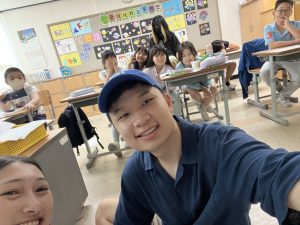
Our excursion to Jeju at the end of the program offered an unexpected yet necessary learning opportunity to conclude our journey in Korea. Every week during our program, my peers and I would meet with our professors to discuss a chapter of Bruce Cumming’s “The Korean War: A History” together, among other discussions and reflections of life in Korea. At first, practically all of us wondered exactly why these discussions were happening weekly; the content of the book was always heavy, highly intellectual, and just hard to break down for an hour’s worth of discussions. They also seemed pretty distant from the work we are actually doing day-to-day in Korean schools as the matters of war and subsequent political polarization spewed by Cummings did not seem to connect any puzzle pieces we had about teaching English to elementary schoolers. But the readings did, for me at least, open my eyes to the seemingly trivial but unconsciously biased opinions I had about the war as a South Korean student in America. I saw that nothing in history nor in today’s reality are as black-and-white as textbooks make them to be; I learned that American saviorism underlined imperialism, and that South Korean success did not come without costs. No matter how intellectually awakening these revelations may have been, they did not feel ‘real,’ nor applicable to the everyday life I led in Korea. Before I went to Jeju, that is. While it was disappointing to hear from our professors that our visit would mostly be limited to historical sights and not the typical tourist destinations that Jeju is known for, I was excited to learn that we would be meeting Jeju island’s activists in-person, spending time with them, eating lunch with them, and even be able to participate in their daily advocacy work alongside them.
Before meeting the full-time activists of Jeju, we also visited the sites where South Korean-led, American-backed genocides of innocent civilians happened right before and during the Korean War, an event we learned from the Cummings readings known as the 4.3 Massacres. A survivor – the brother of one of the victims of the incident decades ago – came up to us to give us his diary from that day. As I read the emotionally drained, hardened writings of the then-high-schooler, I walked across the sites of the massacres, where vegetation had outgrown everything but the deep indents in land where dead bodies had been piled up many years ago. I hadn’t cried like I did at that moment in a long time. My heart ached from the realization that this was part of Korea’s history, part of my history; a history that was neglected for so long, that had caused the pain of the victims and their families to be suffocated for decades. I came out of that experience feeling hopeless, yet hopeful – hopeless because of how voiceless the people of this history had been, hopeful because I could now help find these lost voices of history.
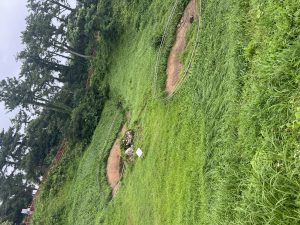
The following activity was the highly anticipated advocacy work. The history no longer felt so distant – I saw people that lived everyday in the living remnant of that history that I had read so much about, and their passion truly inspired me. They lived in the grounds where it all happened, and continues to happen; a distant history is a privilege, I learned. After touring the activist grounds, we were able to join them in their daily protests. It was truly inspiring to see people of all ages and backgrounds come together, hold rainbow flags that read ‘no discrimination for everyone,’ sing national protests songs and dance to music. Some of my peers and I also decided to march with them, and they went all the way to the front of the contested US-built Jeju military base to protest. Many of my coworkers did not participate, understandably due to the politically controversial nature of these protests since we were, after all, from the United States. While I felt that walking in unison with them as visitors and learners of Jeju was the least I could do, protesting in front of Korean and American military soldiers was an uncomfortable thing to do for me as well. We’re students of an American university, sponsored and paid by the American institution to enact change in South Korea, and now I was protesting alongside people yelling ‘get out of Earth, America!’ – kind of ironic, isn’t it? I personally felt conflicted reflecting on my South Korean identity; as a male citizen, wouldn’t I have to serve for the military, and stand on the opposite side of these protests one day? Am I even worthy of being here? Many more questions plagued my mind during and after the protest, but I am glad that I was able to think about these questions. Finding answers probably takes a lifetime’s worth of work, so I feel accomplished in finding the right questions to ask for now. What I can say for sure, though, is that from observing the contested, polarized nature of these things, I know that this history is alive and well today.
After our excursion, I wondered how everything I felt and learned connected to the summer I spent up in the mainland. In a country where American ‘hard power,’ as in the permanently stationed American troops located throughout the country, is well-rooted, the ‘soft power’ that we, as American students coming into the country as temporary visitors, exert on this country should be reflected on; we should always try to be mindful in the things we say, the things we do, and the message we spread subconsciously. And for the multicultural students that we formed valuable friendships with through the summer, I think all we can do is to help them navigate this polarized world, and let them see the world through their own, unbiased eyes. I know it’s vague, but that’s all I can conclude now with all the infinitely complex layers of this world that we have only gotten a taste of. As with any meaningful learning opportunity, I leave with more future aspirations than definite conclusions. I came to Korea this summer thinking I knew so much from the three classes I took my first year, and left knowing confidently that my real knowledge was next to nothing.
As I continue my journey at Duke and complete the major requirements of my International Comparative Studies degree in my attempt to level up this knowledge, I will always keep in mind the real people, real histories that I encountered in my home country. I started studying Korean history because I liked learning about myself, my own history; but now I think I have a different sense of purpose (a less self-centered one, I hope): to do it for others. I’m sure that I’ll be reading, writing and discussing many different histories, including Korean history, in my classes for the next three years and beyond. When I encounter these histories again, I know I will think of the people of Jeju that live in the breathing history of today, the students of Jiguchon that will live in it tomorrow. Although I don’t know how much my academic passions in my undergraduate years will make a difference for them, I think it’s so precious to have a deeper purpose in what I do and the life I want to live beyond college. It’s a lot of bubbly, dreamy talk, but that’s how much this summer changed me; I am inspired to dream, to invest myself in the things that I learned to care about. And I thank you for that, Duke Engage. Till next time!
Mingyu “Matthew” Joo
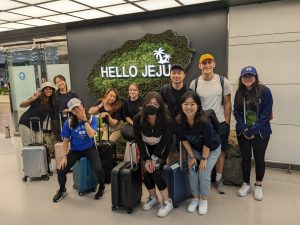
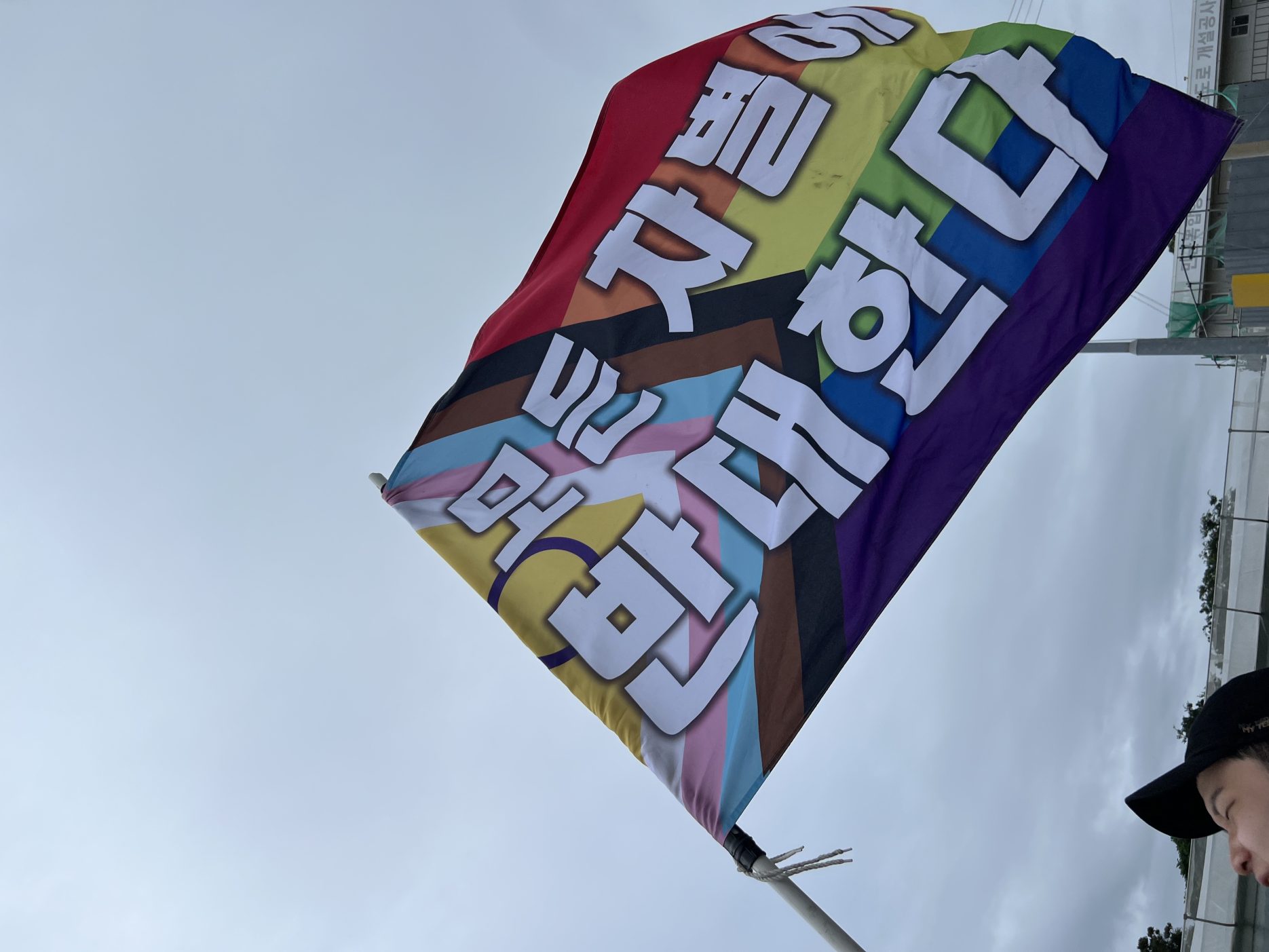
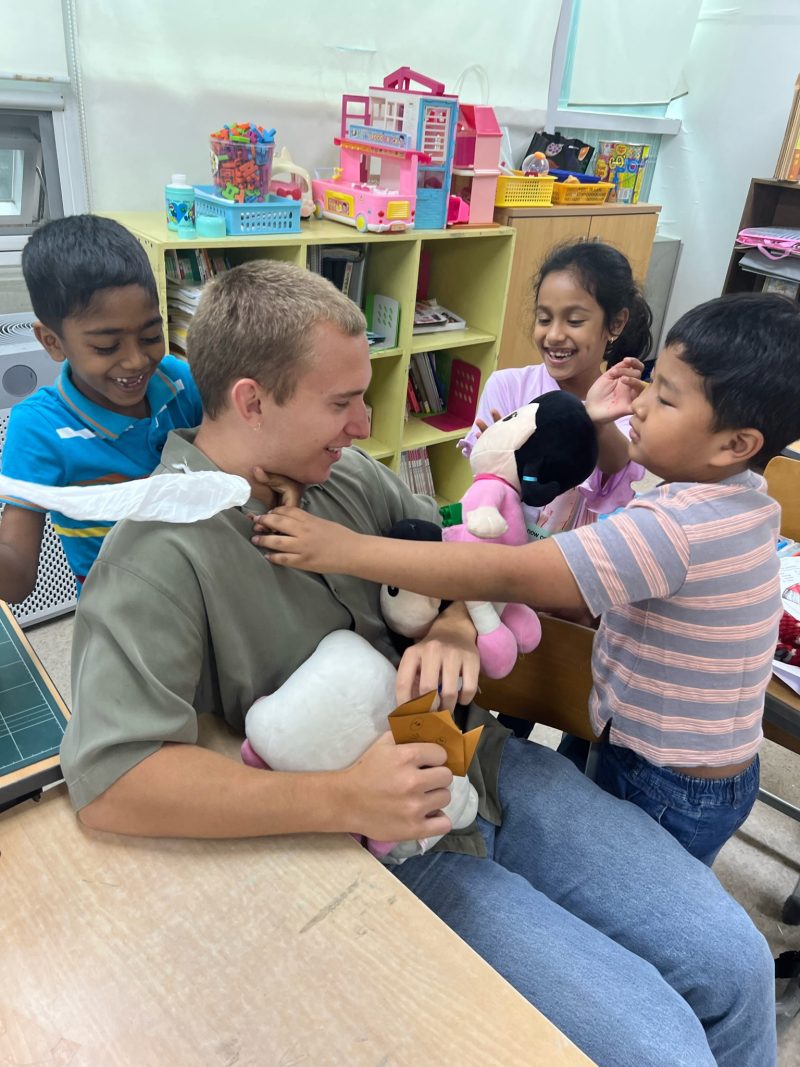


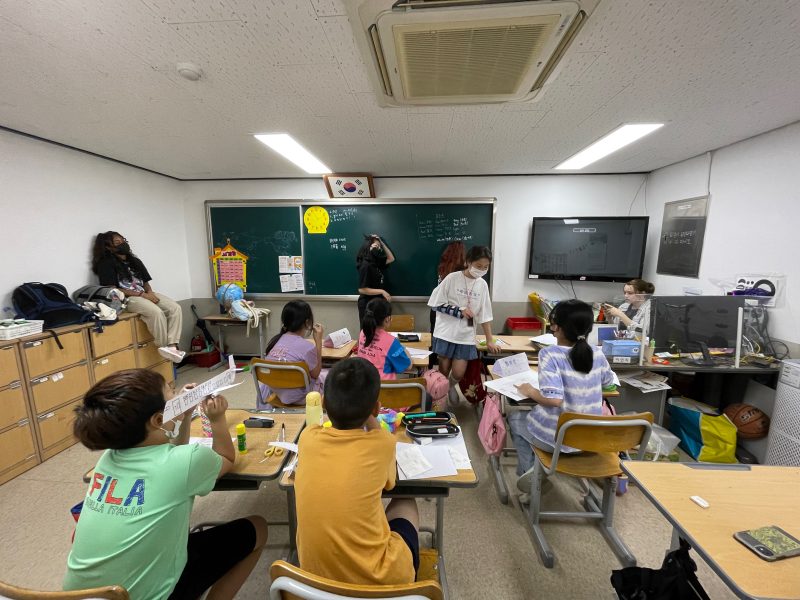
1 Comment
Add Yours →Matthew, I really appreciated your reflections. I’m glad the summer opened up important questions for you, and know you’ll make your world a better place as you sort through them!